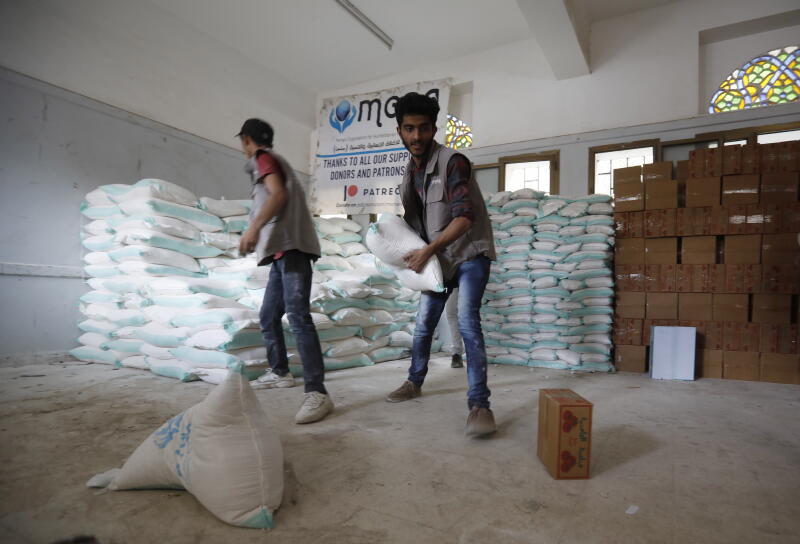The Week In Opinion
Ukraine war sparks global food crisis and nuclear risk
Sign up now: Get ST's newsletters delivered to your inbox

Aid workers prepare emergency food rations from a relief agency for war-affected people in Sana'a, Yemen, on April 24, 2022.
PHOTO: EPA
Russia's war on Ukraine has created a crisis on top of a crisis, says associate editor Vikram Khanna in his latest commentary.
Among second-order crises, the most serious is the global food crisis that is now unfolding across the world. Some of the effects are already apparently locally, in the form of higher prices for groceries and cooked food.
"In other countries, as far afield as Albania, Iraq, Sri Lanka and Peru, food-related protests and riots have already broken out. And we're still in the early stages of what could be a series of disasters," he writes.
The Washington-based International Food Policy Research Institute (IFPRI), which provides policy advice on food issues, recommends that trade sanctions on Russia should exempt food and fertilisers, which account for only about 5 per cent of Russia's export earnings but are vital to the world's food supply.
In many countries that have imposed sanctions on Russia, entities such as banks have refused to support dealings with Russian entities en masse, even in the food sector. "Sanctions need to be more carefully targeted to avoid collateral damage to the world's food markets," adds Khanna.
"On their part, countries should target their food subsidies at the poorest groups instead of extending them to cover more prosperous consumers as well, which is often the case."
Pushing the big red button (or not)
When Russia tested its nuclear-capable Sarmat intercontinental ballistic missile last week, and its Foreign Minister on Tuesday warned of a "serious" risk of nuclear war, it raised the spectre of Mr Putin pushing the big red button.
Some of you may be familiar with the work of economist Thomas Schelling, who drew a link between game theory and strategies of war. Basically, if one actor expects to gain more from being aggressive than any cost the other actor can impose on him, then he is likely to be so.
But for two nuclear powers, going to war could ultimately destroy both countries. Rationally weighing this heavy cost against the benefits of aggression, both sides move towards an equilibrium where neither has incentive to change strategy unilaterally.
In my commentary, I describe:
- Three reasons why game theory cannot explain all of Russia's moves over Ukraine
- Why technology has paradoxically made it easier to wage nuclear warfare
- The limitations of sanctions on Russia.
I write that when Russia shattered the taboo of territorial incursion through violence, and flouted international law in the process, it also kicked the door wide open to the possibility of shattering another taboo - that of the use of nuclear weapons: "Faced with this sobering possibility, world leaders will need to plan for the worst while hoping for the best."
A new Opinion podcast
This week, I spoke to associate editor Chua Mui Hoong on Singapore's 4G leadership renewal, what a refresh of the social compact could look like under the 4G, and who could lead the charge in the next general election due in 2025.
Have a listen to the third episode of In Your Opinion:
Quick hits
- Five conspiracy theories have taken hold in Russia.
- After Ukraine, Moldova may be in Russia's sights.
- We live in a time which is consumed by walls - both literal and metaphorical.


